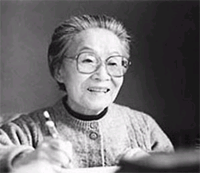Difference between revisions of "Yang Jiang"
imported>Ciic |
|||
| Line 13: | Line 13: | ||
During the Cultural Revolution (1966 – 1976), Yang and Qian met the fate of thousands of Chinese intellectuals and were sent to the countryside. Following their return, Yang wrote "Six Chapters from My Life in the Cadre’s School," revealing their hardships during the Cultural Revolution with a sense of humor. | During the Cultural Revolution (1966 – 1976), Yang and Qian met the fate of thousands of Chinese intellectuals and were sent to the countryside. Following their return, Yang wrote "Six Chapters from My Life in the Cadre’s School," revealing their hardships during the Cultural Revolution with a sense of humor. | ||
| − | A diligent learner, Yang began learning Spanish in her 60s. She translated “Don Quixote” into Chinese, published in 1978. After the deaths of her daughter in 1997 and her husband the following year, she published "We Three" and "Reaching the Brink of Life." She is now | + | A diligent learner, Yang began learning Spanish in her 60s. She translated “Don Quixote” into Chinese, published in 1978. After the deaths of her daughter in 1997 and her husband the following year, she published "We Three" and "Reaching the Brink of Life." She is now 100. |
[[category: writer]] | [[category: writer]] | ||
[[category: women]] | [[category: women]] | ||
Revision as of 00:05, 19 July 2011
Yang Jiang, born Yang Jikang, is a well-known Chinese playwright, author, translator and scholar. She is the widow of the famous novelist Qian Zhongshu, who is widely acclaimed for his novel-"Fortress Besieged."
Born July 17, 1911, in Beijing, Yang is a prolific writer, whose works include "Gratification," "Bath," "Six Chapters from My Life in the Cadre’s School," "We Three" and "Reaching the Brink of Life." The last two works were written in her 90s.
Yang received a bachelor’s degree in literature from Suzhou University in 1932 and entered Tsinghua University, majoring in foreign language and publishing her first work, the essay "Footprint." There, she met Qian and married him. The two went abroad in 1935, studying at Oxford University and Universite de Paris, and had a daughter, Qian Yuan.
In 1938, soon after the outbreak of the War of Resistance Against Japan (1937 – 1945), the family returned to China. Yang took up a professor position at Aurora Women’s University in Shanghai before switching to the foreign language department of Tsinghua University in Beijing.
In the 1940s, Yang wrote a number of comedies, which were staged in big cities such as Shanghai and Beijing, garnering praise. Yang paid little attention to her growing fame, helping her husband to complete "Fortress Besieged." She then became a researcher at the Institute of Foreign Literature under the Academia Sinica in 1952.
During the Cultural Revolution (1966 – 1976), Yang and Qian met the fate of thousands of Chinese intellectuals and were sent to the countryside. Following their return, Yang wrote "Six Chapters from My Life in the Cadre’s School," revealing their hardships during the Cultural Revolution with a sense of humor.
A diligent learner, Yang began learning Spanish in her 60s. She translated “Don Quixote” into Chinese, published in 1978. After the deaths of her daughter in 1997 and her husband the following year, she published "We Three" and "Reaching the Brink of Life." She is now 100.
